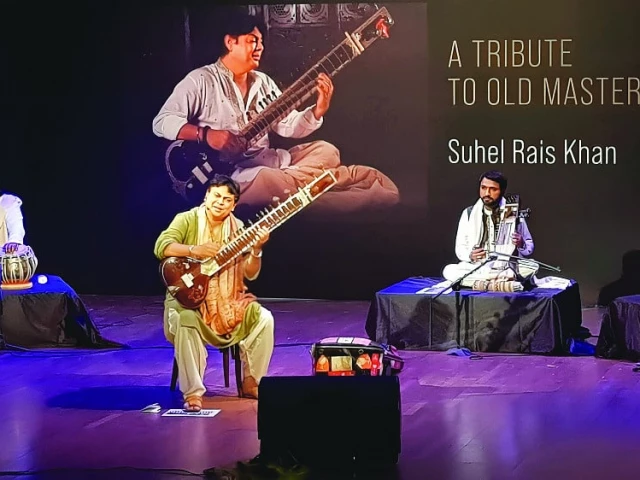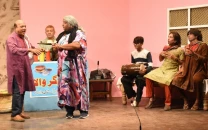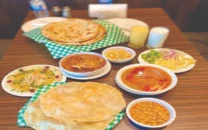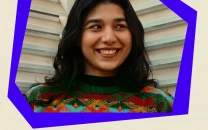Lots of spice and something nice
Suhail Rais Khan's lively tribute to the masters was full of surprises

Nothing warms the soul in the cold quite like revisiting music that grows finer with age. Now, imagine an hour-long celebration of classical tracks that unite generations.
In collaboration with the National Academy of Performing Arts (NAPA), on Thursday night, the Tehzeeb Foundation of Pakistan hosted a musical night dedicated to honouring the masters of Pakistani and Indian music.
Tribute to masters
Headlining the event was sitarist Suhel Rais Khan, son of the legendary Ustad Rais Khan. His reverence for both the old masters and contemporary artists was a poignant reminder that great music is timeless, enduring as long as passion for traditional art continues to burn brightly.
Suhel began the evening with Gori Karat Singhar, a song by his mother, Bilqees Khanum. The awe-inspiring performance set the tone for the night, with a harmonious blend of instruments filling the hall. From the rhythmic tabla to the melodic guitar, each element captivated the audience, drawing them into a musical trance.
Transitioning seamlessly, Suhel performed Tumhen Yaad Karte Karte by Lata Mangeshkar. While replicating the legendary singer's tenderness is no easy task, Suhel instead infused the melody with his own powerhouse vocals, paying heartfelt tribute to the late playback icon.
Launching the evening with odes to legendary female vocalists was a strategic choice, leaving a lasting impression. Continuing this homage, Suhel honoured his father's legacy with Bada Natkhat Hai, a song imbued with innocent mischief.
Engaging the audience
A hallmark of a memorable performance lies in engaging the audience, and Suhel excelled in this aspect. Like Queen's guitarist Brian May, who famously encouraged fans to stomp and clap in We Will Rock You, Suhel brought the crowd into the performance.
The magic unfolded when Suhel performed Dhoondo Dhoondo Re Sajna, urging the audience to clap along. The rhythmic applause gave the performance a dynamic beat, elevating the atmosphere. The energy peaked as the musicians transitioned smoothly into the evergreen Aye Meri Zohra Jabeen, a moment that had the audience cheering and swaying in unison.
Suhel ventured into more modern territory with Piyu Bole by Sonu Nigam and Shreya Ghoshal, showcasing a well-curated mix of tracks. His ability to balance the classical with the contemporary was commendable. At the start of the show, he had expressed his intent: "Today, we wish to remember those who've left a great legacy and those who continue to create great art."
Sharif Awan, the founder of Tehzeeb Foundation spoke to The Express Tribune before the performance. "Suhel has prepared a repertoire featuring mostly the old masters," he said. "We asked him to include songs respected in both Pakistan and India. The tracklist reflects a blend of classical and modern influences, offering an eclectic experience."
With such a promising introduction, Suhel's delivery exceeded expectations. From Ameer Khusro's Chaap Tilak to Mehdi Hassan's Ranjish Hi Sahi, his song selections showcased his mastery. A lively rendition of Noor Jehan's playful Chithi Zara Sayyaan Ji Ke Naam had the audience swaying to its upbeat melody.
Suhel's skill on the sitar also shone throughout the night. The intricate beauty of the instrument was evident as he revisited Mohammed Rafi's classics, blending them seamlessly with Carnatic vocals. His swift, expressive performance of Begum Akhtar's Hamari Atariya Pe Aao demonstrated his technical prowess, painting a vivid tapestry of melodies.
The evening concluded with Farida Khanum's timeless Aaj Jane Ki Zid Na Karo, leaving the audience both nostalgic and spellbound. Despite ending on a melancholic note, Suhel stole hearts one last time, uniting generations through this iconic track.
Final reflections
The performance earned a well-deserved standing ovation. Suhel, ever gracious, stepped forward to greet admirers who flocked to him. Despite the exhaustive effort of delivering such a magical show, he greeted everyone with a warm smile.
Speaking briefly with The Express Tribune, Suhel reflected on his experience performing at NAPA for the second time. "The environment here is always wonderful," he said. "When you have a good space and a great song to play, what more do you need in life? There is no bad music in the world as long as it resonates with people."
The praise and celebration created a memorable evening and offered a warm welcome for the visiting artist. However, attendees drawn by the prominent use of Ustad Rais Khan's name might have found themselves feeling somewhat out of place. Suhel's creative liberties extended beyond the music to his stage presence - a style that may resonate in India but could seem unfamiliar or even intimidating to a Karachi audience.
A performance marked by name-dropping and straightforward renditions of classics can certainly be enjoyable, but it might not resonate with purists. A tribute to the masters, especially one led by Ustad Rais Khan's son, carries a weight of expectation that demands more than a celebrated lineage or commanding stage presence to truly do justice to their legacy.



















COMMENTS
Comments are moderated and generally will be posted if they are on-topic and not abusive.
For more information, please see our Comments FAQ